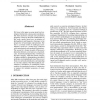Free Online Productivity Tools
i2Speak
i2Symbol
i2OCR
iTex2Img
iWeb2Print
iWeb2Shot
i2Type
iPdf2Split
iPdf2Merge
i2Bopomofo
i2Arabic
i2Style
i2Image
i2PDF
iLatex2Rtf
Sci2ools
97
Voted
KR
1994
Springer
1994
Springer
An Ontology of Meta-Level Categories
We focus in this paper on some meta-level ontological distinctions among unary predicates, like those between concepts and assertional properties. Three are the main contributions of this work, mostly based on a revisitation of philosophical (and linguistic) literature in the perspective of knowledge representation. The first is a formal notion of ontological commitment, based on a modal logic endowed with mereological and topological primitives. The second is a formal account of Strawson's distinction between sortal and non-sortal predicates. Assertional properties like red belong to the latter category, while the former category is further refined by distinguishing substantial predicates (corresponding to types like person) from non-substantial predicates (corresponding to roles like student). The third technical contribution is definition of countability which exploits the topological notion of connection to capture the intended semantics of unary predicates.
Assertional Properties | Automated Reasoning | KR 1994 | Meta-level Ontological Distinctions | Unary Predicates |
Related Content
| Added | 10 Aug 2010 |
| Updated | 10 Aug 2010 |
| Type | Conference |
| Year | 1994 |
| Where | KR |
| Authors | Nicola Guarino, Massimiliano Carrara, Pierdaniele Giaretta |
Comments (0)

